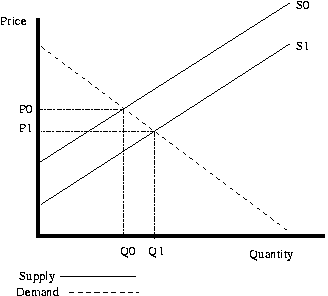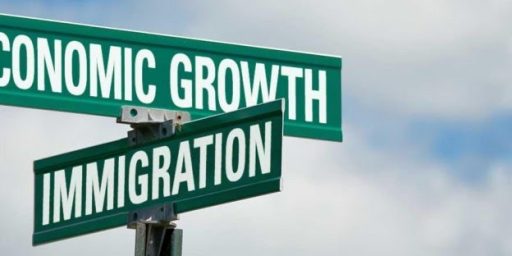Economics 101 and Immigration
I’ve never understood the economic arguments made by opponents to immigration. Or I should say, I understand them I just find them blindingly stupid. Case in point, this post by Kevin Drum. Kevin writes the following,
Now that’s an odd thing, isn’t it? Immigration foes like Gilchrist insist that if we only cut down on the supply of Mexican farm workers, wages and benefits would go up and plenty of Americans would be available for harvesting our leafy greens. And yet, despite this year’s severe shortage of Mexican labor, Vessey is apparently offering the same backbreaking work, brutal conditions, low pay, and nonexistent benefits that he always has. Likewise, Ed Curry, a chili farmer who has given up on employing legal workers because the H2A program has “too many snafus,” says only that he would be willing to pay legal workers “a bit more” than he does now.
This is often the argument that many who oppose immigration put forward. We’ll limit the number of immigrants (illegal and legal–after all most immigration opponents nearly had a complete bowel prolapse when Bush came up with his guest worker plan) and wages will rise, Americans will now take the jobs and nirvana will result. What never seems to enter the calculus of these anti-immigration warriors is another possibility: the farmers and other firms simply shut down and don’t hire all that many more Americans or even result in more Americans losing their jobs.
Even Kevin Drum, who is no foe of immigration, doesn’t seem to get this point at all. For example, he writes,
Is this reluctance to increase wages caused by a fear that higher labor costs would make their produce too expensive to sell? On its face, that seems unlikely. Even a whopping 40% increase in farm wages would increase the wholesale cost of produce by only about 10%. But a shortage caused by letting crops go unharvested would surely have the same effect — and supermarkets would continue to buy.
That’s not to say that foreign competition isn’t a real issue for California farmers. It is. Still, the lesson from this natural experiment along the Arizona border seems pretty clear: farmers are flatly unwilling to pay their workers more. Whether that’s because it would price their produce out of the market or because even a big wage increase wouldn’t attract enough legal workers hardly matters. The evidence indicates that farmers would rather let their crops rot in the field than pay ten bucks an hour.
What is missing is a look at the profitiability of the farms. The wholesale cost goes up by 10% yet the cost of labor goes up by 40%. Now maybe labor is only a quarter of the total costs in running a farm, but it may very well be a larger portion, like say 50%. So why would the wholesale price go up by only 10%? Supply and demand. Look at this picture,

Notice the supply curve has shifted “downwards”. This could represents a shift in supply due to an decrease in costs. But look closely at the distance between the curves S0 and S1 and the price decrease P0 and P1. The distance between the two curves is greater than the price increase. And the same thing works in reverse. Suppose we started at curve S1 and went to S0. In this case, the price increase would be less than the increase in costs. This is why firms cannot simply pass along 100% of their cost increases to their customers. Demand curves are downward sloping. I know this is obvious, but most people just don’t seem to get what the freaking Hell this means. Most people assume that a firms costs go up by $1/unit of output and so the price goes up by $1/unit of output. I’m sure firms would like to do this, but the reponse by consumers prevents this. And the “flatter” the demand curve, the smaller the price increase. For example, if the demand curve was horizontal then there would be no price increase at all. Would supermarkets still buy more expensive produce? Sure. Would consumers? Again, sure. But they wouldn’t have to buy as much. So noting that people would still buy is stupid. Of course they are, the question is how much will they buy. Just as much as before? Maybe, but that tells me that demand is perfectly inelastic, which frankly I doubt.
Still, Kevin does come to the right (in my opinion) conclusion about illegal immigration:
In other words, Gilchrist and his nativist ilk are barking up the wrong tree. What we need isn’t a bunch of yahoos dotting the border with their lawn chairs and cell phones. Instead, we need to recognize that — like it or not — Americans very clearly want and rely on immigrant labor. The key, then, is not to eliminate it, but to figure out a rational way of limiting illegal immigration without simultaneously demonizing immigrants themselves. This might include programs that make it harder to cross the border illegally, but only if we also provide legal status to many more immigrants than we do now.
Funny, did Kevin just endorse a guest worker plan…just as President Bush has advocated a guest worker program? Egads!






I think I am one of those who has been skeptical about the government’s ability to properly regulate immigration in the form of a guest worker plan – and in no way have I meant to demonize immigrant workers. I am unclear whether there will be eventual claims by these workers on entitlement programs available to citizen workers and whether our economy can afford the added burden. Is it possible that guest workers could have naturalized extended families living in the United States and that there will be pressure by these families to allow guest workers to make claims on health care for example? Just a concern, that is all.
Funny, I was jumped all over on a right wing blog recently for saying that illegal immigration was a demand pull issue that just reflected the free market working the way it was suppose to.
If the President continues to push for a guest worker program it must require that illegal aliens return to their homeland to participate. The idea of a fine being sufficient punishment for coming to the U.S. illegally is simply a nonstarter.
President Bush needs to show a sincere determination to stop illegal aliens from crossing the border. This requires more resources for catching illegal aliens and punishing them after they are caught. It also requires that those that employ illegal aliens must be punished. Just as importantly all levels of government must treat illegal aliens as criminals. They must be detained when found, not supported.
The plan also should include incentives for Mexico to make at least some effort to discourage illegal crossing the U.S.-Mexico border.
Senator Specter’s proposal to massively increase legal immigration could be part of meaningful immigration reform, but only with a determined effort to control the border and punish those that come here illegally as well as those that support them.
FWIW, I wasn’t even considering demand issues. Labor accounts for less than a third of farm costs, so a 40% increase in labor costs would (approximately) cause a 10% increase in total produce cost. Whether the market could bear that increase is another question entirely, although I suspect it could since letting harvests rot causes prices to go up too. If foreign competition were the issue, unharvested crops would be replaced by foreign crops and prices would remain unchanged.
As for a guest worker program, I’m pretty skeptical. It’s not the worst idea in the world, but as I said in my post, I’m in favor of allowing more legal immigration while cracking down somewhat on illegal immigration. The idea is to get the incentives right. Make legal immigration easier and illegal immigration harder. This would increase the cost of illegal immigration, decrease the cost of legal immigration, and thus give us the right sized pool of legal immigrant labor that Americans obviously want. Needless to say, though, it would take some fiddling to get the incentives just where we want them.
BTW, the supply/demand curve you show doesn’t really tell us anything unless we know the various values of S0, S1, the slopes of the lines, etc. As it happens, a 40% increase in labor costs would increase wholesale costs by about 10%, but would increase retail costs by only about 2-3%. Why? Because farm labor is a very small part of the final retail price of produce.
Now, that increase would indeed decrease demand, but it’s small enough that it probably wouldn’t decrease it by much. Thus, the effect on farmers would almost certainly be small unless foreign competition could undercut domestic prices. It’s possible that this would happen, but I don’t have the data handy to know for sure.
In any case, it’s not what I’m suggesting anyway. I’m suggesting an increase in legal immigration, which would probably increase wages a bit, but not by anything like 40%.
first of all , it’s not immigration, for the most part, it’s trespassing. why should anyone have any respect for a government that puts every concieveable burden on it’s citizens and refuses to enforce the law when it comes to those here illegally. here in the midwest ,it is not farm labor, it is small businessmen who profit by cheating illegals out of even minimum wage,while they become millionaires through tax evasion and slave labor. ordinary working people are then straddled with the burden of paying for their medical & education bills, which should be included in a living wage. we also cater to their culture to the ruin of our own, by encouraging the use of spanish ,while not encouraging assimilation. in short it is nothing short of government subsidizing rich business owners by allowing slave labor. we do not enjoy lower prices as a result of this practice since we pay even more in economic,social, & government costs.
When floyd’s right, he’s right.
Slave labor = $0 wage. So please stop that kind of redefinition of words.
A living wage is a horrible idea in that it is basically a price floor that will cause a misallocation of resources.
How do you know? I agree it is subsidizing of businesses to some degree, but that doesn’t mean that consumers don’t see part of that subsidy reflected in lower prices. Or are the laws of economics suspended when a firm hires illegals.
Kevin,
The point of the graph wasn’t to show estimated supply and demand functions, but to give an idea of what happens when supply changes due to a change in the costs. Price can change, but usually less than the change in costs. So the observation about retail sales being 2-3% might very well be right, but it could still make demanders in the wholesale market (firms) look elsewhere for suppliers.
It would be interesting to see the numbers run on cost per taxpayer of gov’t “handouts” to immigrants, vs. profit per taxpayer from lower prices.
In any event, here’s a question from someone blissfully ignorant of immigration policy:
If we really want to enforce the immigration laws, why not put an employer in jail for 30 years for hiring anyone who lacks proper documentation? Wouldn’t that cut off the supply of jobs for illegals?
Second question, if anyone’s giving out answers today: what would be so terrible about the resulting free-market adjustment to wages, prices, etc.?
Anderson,
As to your second question, I don’t have a problem with it, but then again I’m an economist by training so something like market equilibration is not a scary concept to me.
Personally, I’d be curious to see how many American’s would lose jobs if we stopped all immigration (especially illegal immigration). My guess is that it would be something the anti-immigration people wouldn’t like. Just as free trade can cost jobs in one sector, but create new jobs in both sectors and improve the economies of both countries. Also, nobody takes into account the impact of immigration on social security.
nope, slave labor is expensive; food , housing, medical care, clothing etc. which is actually more than is being paid by the exploiters. i know because i receive my tax bill every year and i personally know many of the exploiters well enough to be privy to their finances. thirty-days for each offence would stop it[or a $1000 fine each and every offence]
illegals don’t pay toward social security since their [owners] pocket the taxes and the social security money. that,however does not stop them from collecting on almost every gov’t program!
of course the laws of economics are suspended, at the same rate as the laws of the land. especially when taxpayers are forced to make these practices possible by government collusion or indifference. we pay dearly for this.
dan, the fines should be levied on employers, not workers, and they need to be consistently applied. the practice will stop when it costs more than legal behavior. legalizing it won’t make it right either[as bush wants to do] incidently , don’t confuse “right wing” with conservative. today [more than usual] decent values are shouted down by the loud ‘cussing of currency”
I didn’t say it was cheap, but that there was no wage.
Got anything to back that up? Many illegals obtain fake social security cards/numbers and those are used to pay SS taxes.
Okay, thanks for letting me know that rational discourse with you is no longer possible on this topic.
Check out “How Much Is that Tomato in the Window? Retail Produce Prices Without Illegal Farmworkers by Wallace Huffman and Alan McCunn at http://www.cis.org/articles/1996/back296.htm
Bottom line:
The removal of illegal workers from the seasonal agricultural workforce would increase the summer-fall supermarket prices of fresh fruits and vegetables by about 6 percent in the short run and 3 percent in the intermediate term. During the winter-spring seasons, prices would rise more than 3 percent in the short term and less then 2 percent in the intermediate term. Imports would increase about 1 percent.
ok, circumvented in both cases since it might be argued that suspended is not possible.however; you would have to go back to the slave trade to find more corruption ,abuse of human rights, or flagrant exploitation. for an explanation of the economic motives behind a good portion of this activity,i recommend ” the leveling wind” by George Will. he refers to it as “the intentional peonisation of the american worker. those involved have disregarded the fact that with great privelege comes great responsibility. please pardon my lack of rationality in the face of a country so steeped in rationalization.
The “anti-immigrant” epithet isn’t much more instructive than “open borders globalist,” since almost no one is either. “Nativist” is another term from the Wall Street Journal handbook of illegal alien red herrings.
It’s possible to have guest worker programs that don’t legalize illegals. Tancredo has one, HR. 3333. It’s possible to oppose legalizing illegals without opposing immigrants, since illegals aren’t immigrants. In fact, proposals like the President’s would legalize illegals at the expense of decent, hardworking guest worker applicants who haven’t violated our laws.
Use a guest worker program to meet America’s labor needs while also providing encouragement for illegals to deport themselves. Let the illegals know that they must go home to apply without preference over those who haven’t broken our laws. That’s the carrot. Punish illegals and their employers who continue to flout or laws. That’s the stick. They will go.
Surveys show that 90% of illegal aliens are making more than minimum wage.
Most illegals are employed under false documents. In these cases, they are paying income taxes and Social Security, but will never be able to recover their Social Security payments.
Illegals are employed everywhere, not just as farm workers (where they probably only stave off further mechanization and automation), but also they play a major role in the construction trade and the massive expansion of home building (along with falling prices per square foot of house). They also play a major role in janitorial and food service industries in the U.S.
The biggest arguments I hear from right wingers about illegal immigration go along these lines: “They are a big cost because of [insert SOCIALIST program here].” I wish the right wingers would stop supporting socialist programs.
Floyd,
Great, we get an oligarchy or some such. No thanks.
James,
Nice link thanks. I see that the authors use a 15% increase in the wage rate for seasonal agricultural service workers with zero immigrant workers. Surprisingly small, I wonder why.
Sabertooth,
I’m all for a guest worker program and I’d also consider making legal immigration easier. This way, they get taxed instead of free loading off the system as floyd notes.
I learned a lot just perusing this issue. Some solid thinking and perhaps one touchy comment!
May I suggest -stick with the issue -not the person responding and a lot more gets accomplished.
The present system works the way it does because the people in place want it to work the way it does. We may not like that fact, but if the present system had faults, it would be changed, or the price would increase enough to make foreign produced goods more attractive to the buyers and the public.
This is the same reason that tomatoes and avocados do not taste like anything, anymore. Because it’s cheaper to pick them while they’re green, (and they bruise less, and are tasteless) and it appears not to matter to the average homemaker anyway!
A note below on direct costs of illegal immigration, though it is the costs to social cohesion that are of more concern to me:
Immigration costs more than thought [brief notes with link to full text]
by Peter A. Brown, Orlando Sentinel, October 14, 2005
ECONOMIST DAVID DENSLOW (favorably disposed to immigration) nonetheless concludes: Immigrant households in florida consume, on average, $1,800 more in state services (mostly in education and medicaid services) than they pay in taxes. The $1800 net cost per household does not include costs of federal services.
DENSLOW’s COST ESTIMATE IS STURDIER THAN PREVIOUS ESTIMATES because he focuses on households rather than individuals: “Denslow says his estimate of the net cost of immigrants is more accurate than previous ones that showed little financial impact because he did his analysis by family, rather than by individual. Previous studies counted the number of individual immigrants in calculating the cost of immigration. But that method underestimates the costs of immigration, he said, because it does not take into account the fact that immigrants have children who are born in the United States. When one calculates the cost of immigration by individual immigrant, those children, who are U.S. citizens, are not counted. But, these children use government services and will not pay taxes for many years, and if their parents had not immigrated, they would not be in the United States to begin with.”
oligarchy? no,too many things are run by committee as it is.a sense of responsibility comes from the heart of EVERY decent recipient of grace or privelege. it used to be called common decency,before people became offended by the very concept.